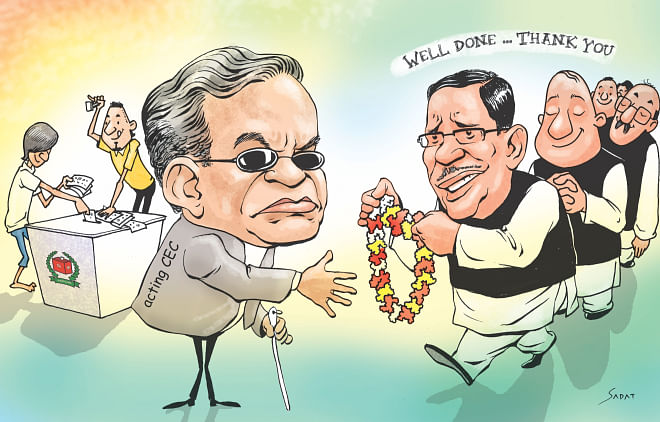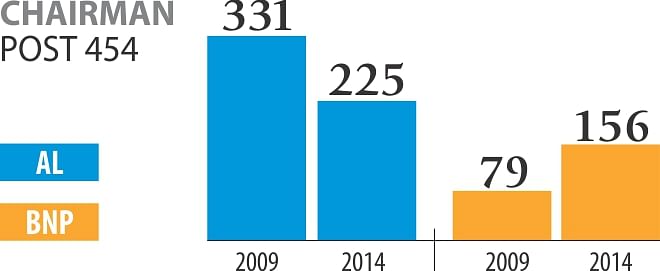AL loses grip on upazilas

Despite resorting to widespread rigging in the just-concluded upazila polls, the Awami League has failed to match the success it had in the local body elections five years ago, which indicates a sharp decline in its popularity.
Candidates backed by the ruling party secured 225 chairmen posts in the 458 upazilas that went to polls in five phases between February 19 and March 31. (Results in four upazilas remain withheld.)
In stark contrast, the AL men won 331 chairmen posts in the same upazilas in 2009. The polls were held three weeks after the parliamentary elections in which the AL won a landslide.
The BNP that suffered a debacle in the December 2008 national polls for its previous misrule received a heavy blow in the upazila election of January 22, 2009. The candidates it backed won in only 79 upazilas.
In the first large-scale battle of ballots with their rivals since, the BNP favourites secured 156 chairmen posts in this year's upazila polls.
 The BNP men, however, boycotted elections in 70 upazilas, protesting rigging and violence by the AL men. In these upazilas, the AL-blessed contenders made a clean sweep.
The BNP men, however, boycotted elections in 70 upazilas, protesting rigging and violence by the AL men. In these upazilas, the AL-blessed contenders made a clean sweep.
The AL-backed candidates also grabbed almost all the chairmen posts in the upazilas where violence, capture of polling stations and ballot-box stuffing were rampant. In 110 such upazilas, AL men won 92 chairmen posts with huge margins.
Analysing the outcomes and the mood of the polls, former caretaker government adviser M Hafizuddin Khan said, "It's a clear signal that the government's popularity has reached rock bottom."
According to him, people voted against the candidates backed by the ruling party. "The government should understand people's sentiments and take corrective measures," he told this correspondent.
Political analyst Prof Nizam Ahmed, a teacher at Chittagong University, has said the just-concluded upazila polls reminded us how the ruling party men turn desperate when they see a decline in their popularity and show little confidence in voters.
Local government expert Prof Tofail Ahmed has said it seems the number of anti-AL voters is on the rise.
"Having been denied the voting rights in the parliamentary elections, people got an opportunity to vote against the government in the upazila polls," he told The Daily Star yesterday.
But Prime Minister Sheikh Hasina, also the AL chief, believes her party-backed candidates could not fare well in the first two phases of the polls due to the party rebels.
“We took initiatives to make sure that a single candidate contested the polls in the later phases and then the party did well. As the Awami League was doing well, reports claimed that the party rigged the polls,” she said on March 27.
AL Presidium Member Obaidul Quader, also communications minister, however, said they would try to find out the reasons why the party men could not achieve cent percent success in the upazila polls.
"Through the polls we got a clear idea about the party's strength, which will be useful to boost up the grassroots' morale," he told reporters yesterday.
According to Prof Nizam, the AL was well aware of the decline in its popularity before the January 5 parliamentary elections and its high-ups fixed the strategy accordingly.
The fall in AL's popularity became evident first in the five city corporation elections held in mid-last year when its candidates suffered crushing defeats to BNP-backed contenders.
Party grassroots blamed government's failure in handling several critical national issues for the defeat. They argued that the party-backed mayor candidates lost as those failures overshadowed the government's success in other fields over the past few years.
In the run up to the city polls, the BNP men launched a clever campaign. Instead of focusing on local issues, the party highlighted the issues like share market and Hall-Mark scams and allegations of corruption in the Padma bridge project.
Despite such a drop in popularity, the AL easily won the January 5 one-sided general election, with the BNP-led alliance boycotting it.
As many as 154 MPs were elected uncontested.
The controversial election caused a furor among people, as they were denied their voting rights.
Ahead of the upazila elections, the BNP men highlighted the controversial parliamentary election along with some other national issues to woo voters. The negative campaign seemed to have worked well in the beginning.
But the ruling AL men countered the campaign by resorting to widespread violence and rigging.
The ruling party men lagged behind their rivals in the first two phases that saw less violence and rigging than in the last three phases.

 For all latest news, follow The Daily Star's Google News channel.
For all latest news, follow The Daily Star's Google News channel. 




Comments